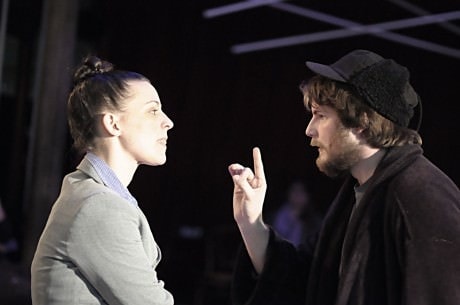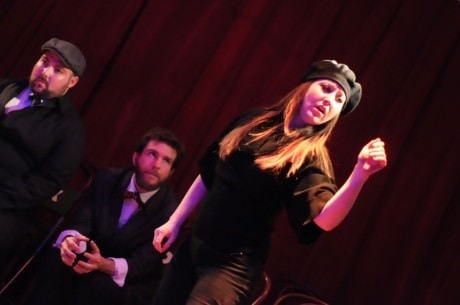![]()
A twisted approach to Chekhov can be a tricky thing to handle, but think of it less as a retooling and more as a personalized approach, an experience catered to the audience, with input from the ensemble, as Writer and Director Ben Hoover brings A House, A Home to Glass Mind Theatre. This twisted take on one of Chekhov’s most famous plays brings refreshing insight as well as pop culture and modernism to the tale of these three sisters and just how dysfunctional their lives truly are.

Set Designer C-Mo Molloy makes fantastic use of the unusual space that the company finds themselves in for this production. Working in the confines of what looks like the framework of an old house, Molloy adds piping all along the walls and across the ceiling to capture the action of the show in a tightly confined space drawing the parallel between their performance and the fact that the characters are trapped not only in the one house, never able to leave, but in the deeply tangled drama of their own lives.
Director Ben Hoover brings echoes of Chekhov’s original work into this new piece of theatre that he presents to the audience. It feels almost like an open forum on the author with the very beginning of the production being less of the production itself and more of a throwback style history lesson on Chekhov’s writing and stylistic elements. Normally such a piece of pre-play exposition would seem droll and superfluous, but the way in which its presented, bringing the actors from the role as simple actors into their characters, allows the audience to connect to the piece without requiring a previous knowledge of either Chekhov or The Three Sisters.
The play overall has a mysterious sense of delay; there are moments — no scene or particularly event between the characters in particular — where the pacing drifts along rather than move with a sense of urgency or completion. This comes from Hoover’s concept of further entwining the audience into the performance piece by allowing them to choose the event in which the story unfolds. There are four different versions of the story you can see, all determined by a simple survey question asked of each audience member at the beginning of the show. By incorporating what the audience hopes to gain from such a production, Hoover fully integrates the theatrical experience not just for those involved but for those that have simply come to observe.
It is a fascinating piece, whether you know Chekhov or not, watching the way the deeply twisted lives of these rich characters unfold right before your eyes; the delicate balance of family dynamics disintegrating in slow motion, the unraveling of personalities and the individual; making for a compelling if off-the-beaten-path night of entertainment. Hoover’s choice to integrate the actors into the audience, having them sit alongside you, scattered throughout the house brings their reality right into your face and makes for a very unusual play-going experience. There are moments where you find yourself watching those sitting next to you more closely as they react to what’s happening at the center of the stage and it is simply stunning.
The ensemble work is brilliant, each actor becoming a character profile of sorts, presented as an individual to the audience, only to have their identity defined by their involvement with others. Andrey (Andrew Peters) being the male in the Prozorov household but defined by the way he is ruled by his sisters, no longer just Andrey but ‘the brother’ or ‘the other’ as the case were. Hoover sparks inspiration for the characters to find their own personal links to the Chekhov characters making them both modern and classic, timeless and aged all in one go.
There is a story to be told, with hints and shadows of the original Three Sisters plot but Hoover’s adaptation follows more closely to the interpersonal relationships that the characters develop, rather than focusing on the action of the play itself, which as in most Chekhov plays always happens off-stage and between scenes. There are even cleverly placed moments of crying babies to punctuate the many births referenced throughout the original story; a throwback nod to how time passed in the original story without much else to indicate it.
Taking up the titular trio are actors Amy Parochetti as Olga, Ann Turiano as Masha, and Jasmine Andersen as Irina. The trio are seldom seen on stage together, their lives only tangling together for brief moments late in the second act, but when they do you can see all of their struggles come full circle in those simple moments of reflective bliss. Their individual scenes as women still show their strong bonds of sisterhood even when the others are not present. Parochetti, who does not receive much stage time at all until her breakdown at the end, is a reserved and yet highly revered woman who plays a stiff and strong character, proving that even the most well put together of the bunch is prone to failure and letdown. Parochetti opens the production with a speech about how she personally connects to Chekhov’s work and it is one of the most beneficial pieces during the ‘metaplay’ introduction.
Andersen as the slightly aloof and melancholy Irina is much more subdued and less gritty in her performance. The dating game scene featuring the bachelors that she knows all too well (Alex Smith, Dave Gamble, and Joel Ottenheimer) becomes a wildly exciting way of incorporating the modern notion of picking a suitable husband against the choices that her character was forced to make in the timeframe of when The Three Sisters occurred. Andersen carries a sweet disposition even in her moments of uncertainty and despair.

One of the strongest performers in the piece is Ann Turiano as Masha. An apathetic woman who is driven with ill-purposed apathy, Turiano is like a bolt of lightning clad in black whenever she takes to the stage. Her intense scenes come from inappropriate flirtations with Vershinin (Alexander Scally), a series of hot and flash dialogue exchanges that tumble into a steamy moment of intense romance. Her husband, Kulgin (Joshua Burrsma) makes the moment that much more gripping as he sits trying to ignore it. Turiano has flare-ups of fury that drive her through the production and she is a pistol at the best of times, even if mildly tempered from moment to moment.
A House, A Home is a fascinating approach to such a classic theatrical piece and the efforts of Hoover and cast are commendable for boldly daring to re-imagine Chekhov’s work.
Running Time: Two hours and 20 minutes, with one intermission.
A House, A Home plays through April 14, 2013 at The E.M.P. Collective — 307 West Baltimore Street, in Baltimore, MD. Tickets can be purchased at the door, or online.

